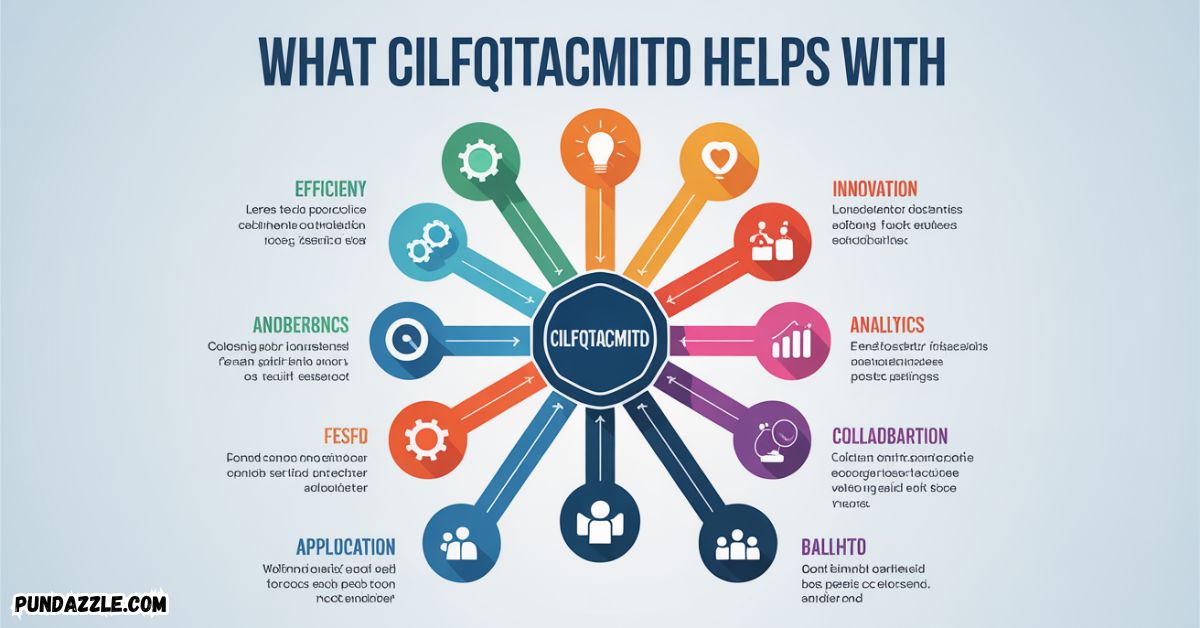In today’s rapidly changing business environment, companies must adapt to survive. One transformative approach gaining traction is CILFQTACMITD, or the Configurable Intelligent Layered Framework for Quantum-Aided Cognitive Management and Intelligent Decision-Making.
This framework integrates advanced technologies like Artificial Intelligence (AI), Machine Learning (ML), and Natural Language Processing (NLP) to enhance various business processes.
This article unpacks what CILFQTACMITD helps with, highlighting its core capabilities, applications, and long-term benefits.
What Is CILFQTACMITD?
CILFQTACMITD represents a sophisticated approach to managing cognitive tasks within organizations.
At its heart, it combines several layers of technology designed to streamline operations, enhance decision-making, and foster innovation.
By leveraging predictive analytics and intelligent automation, businesses can achieve higher efficiency and better outcomes.
Purpose and Goals
The primary goal of CILFQTACMITD is to facilitate data-driven decision-making. In an era where information overload is common, having a structured framework helps businesses identify actionable insights quickly. Here are some key objectives:
- Enhance Operational Efficiency: Streamline processes to reduce time and costs.
- Improve Decision Quality: Use advanced analytics for better strategic choices.
- Foster Innovation: Integrate cutting-edge technologies to stay competitive.
Architecture & Core Capabilities of CILFQTACMITD
Understanding the architecture of CILFQTACMITD is essential to appreciate its functionalities. It consists of several interconnected layers, each serving a specific purpose.
System Architecture Overview
The framework includes:
- Integration & Data Layer: Responsible for data collection and management from various sources.
- Cognitive / Analytics Layer: Analyzes data to derive insights and support decision-making.
- Adaptive Management Layer: Implements real-time adjustments based on analytics.
- Quantitative Tracking Layer: Monitors performance metrics and KPIs.
Core Capabilities
Each layer contributes to the overall effectiveness of CILFQTACMITD. Here are some core capabilities:
- Real-Time Data Processing: Instant analysis of incoming data for timely decisions.
- Feedback Loops: Continuous learning mechanisms that improve system performance.
- Self-Learning Systems: Adapt and evolve based on new information.
Core Layers Explained
A deeper look into the core layers of CILFQTACMITD reveals how they integrate to form a cohesive system.
Integration & Data Layer
This foundational layer connects various data sources, including IoT devices and cloud services, to ensure a comprehensive data pool for analysis.
Cognitive / Analytics Layer
Here lies the power of predictive modeling and advanced analytics. This layer processes data to generate insights that support strategic decision-making.
Adaptive Management Layer
This layer focuses on workflow optimization and task management algorithms, allowing businesses to adapt their operations in real-time based on data insights.
Quantitative Tracking Layer
Monitoring performance is crucial. This layer employs KPI tracking and quantitative tracking mechanisms to measure the effectiveness of strategies implemented.
Also read: Exchange FTAs In Asia Trading: How Free Trade Agreements Work
Key Terms and Concepts
To fully grasp CILFQTACMITD, familiarizing oneself with some core terms is essential:
- AI-Driven Workflow Optimization: Automating processes to enhance efficiency.
- Predictive Intelligence: Using historical data to forecast future trends.
- Cognitive Systems: Technologies that mimic human thought processes.
Business Applications of CILFQTACMITD
CILFQTACMITD has numerous applications across various sectors. Here’s how it makes a difference:
Operations & Process Management
CILFQTACMITD streamlines workflows through intelligent automation. Businesses can expect:
- Efficiency Improvements: Reduction in downtime and enhanced productivity.
- Resource Allocation: Optimizing resource use based on real-time data.
Customer Experience & Engagement
In an age where customer expectations are high, CILFQTACMITD can elevate engagement through:
- Personalized Interactions: Tailoring experiences based on customer data.
- Enhanced Support Systems: Implementing intelligent decision systems for better service.
Decision-Making & Strategic Planning
Data-driven insights significantly improve decision quality. Businesses can leverage:
- Predictive Analytics: Anticipating market trends and customer behavior.
- Scenario Simulation: Testing various strategies before implementation.
Productivity & Time Optimization
CILFQTACMITD can dramatically reduce time spent on mundane tasks through:
- Automated Processes: Freeing up employees to focus on strategic initiatives.
- Real-Time Dashboards: Providing instant access to performance metrics.
Innovation & Technology Integration
Integrating emerging technologies is crucial for staying competitive. CILFQTACMITD facilitates:
- Adaptive Cognitive Management: Ensuring businesses can quickly pivot based on new technologies.
- Cross-Domain Integration: Merging insights from different sectors for innovative solutions.
Sector-Specific Impact of CILFQTACMITD
CILFQTACMITD’s versatility allows it to impact various sectors significantly. Here are three examples:
Healthcare: HealthSync Hospital
HealthSync Hospital implemented CILFQTACMITD to enhance patient care through:
- Predictive Diagnosis: Utilizing data to forecast health issues before they arise.
- HIPAA Compliance: Ensuring patient data privacy while leveraging advanced analytics.
Education: EduPlatform
EduPlatform adopted CILFQTACMITD for:
- Adaptive Learning Systems: Personalizing education based on student performance analytics.
- Resource Optimization: Efficiently allocating resources to improve learning outcomes.
Smart Cities: CityNova
CityNova uses CILFQTACMITD for:
- Traffic Management: Real-time data processing to optimize traffic flow.
- Energy Optimization: Using predictive models to enhance energy efficiency in urban areas.
Key Benefits of CILFQTACMITD for Business
The advantages of implementing CILFQTACMITD are profound:
Enhanced Efficiency
CILFQTACMITD allows businesses to streamline operations, leading to significant cost reductions. By automating repetitive tasks, organizations can focus on strategic initiatives.
Cost Reduction
With improved operational efficiency, businesses can achieve:
- Lower operational costs: Streamlining workflows reduces resource wastage.
- ROI (Return on Investment): Enhanced productivity leads to better financial outcomes.
Competitive Advantage
In a crowded market, leveraging CILFQTACMITD can set businesses apart. Those who adopt this framework can:
- Innovate Faster: Stay ahead of competitors by rapidly implementing new technologies.
- Adapt Quickly: Responding to market changes becomes more manageable.
Improved Accuracy & Decision Quality
By utilizing advanced analytics and real-time data, businesses experience:
- Less Error-Prone Decisions: Data-driven insights reduce human error.
- Higher Confidence in Strategies: Decisions based on solid analytics yield better outcomes.
Also read: Team Disquantified: What It Means And Why It Matters
Challenges & Considerations
While CILFQTACMITD offers numerous benefits, businesses should be aware of potential challenges:
Implementation Complexity
Integrating CILFQTACMITD into existing systems can be daunting. Companies must consider:
- Skill Gap: Training staff to manage new technologies.
- System Compatibility: Ensuring that existing infrastructure supports the new framework.
Data Privacy & Regulation
Compliance with regulations like GDPR and HIPAA is crucial. Businesses must implement:
- Data Privacy Measures: Ensuring that data is handled responsibly.
- Bias Audits: Regularly reviewing algorithms for fairness and transparency.
Best Practices for Implementing CILFQTACMITD
To successfully implement CILFQTACMITD, consider the following best practices:
Step-by-Step Guide
- Assess Current Infrastructure: Understand existing systems and identify gaps.
- Define Objectives: Clearly outline goals for adopting CILFQTACMITD.
- Pilot Programs: Start with small-scale implementations before scaling up.
Tailoring for Your Business
Customization is key. Ensure that CILFQTACMITD aligns with your specific industry needs:
- Healthcare: Focus on data privacy and patient outcomes.
- Retail: Emphasize inventory management and customer engagement.
The Future of CILFQTACMITD
As technology continues to evolve, so will CILFQTACMITD. Here are some predicted trends:
Toward Cognitive Autonomy
The future is leaning towards cognitive autonomy, where systems will increasingly operate independently, enhancing efficiency and decision-making.
Convergence with Emerging Technologies
Expect to see integration with:
- Quantum Computing: Enabling faster data processing and advanced analytics.
- Federated Learning: Enhancing data privacy while improving model accuracy.
Smarter Governance & Ethics Frameworks
As AI becomes more integrated into business processes, ethical considerations will become paramount. Companies must adopt:
- Ethical AI Governance: Establishing frameworks for responsible AI deployment.
- Transparency in AI Models: Ensuring that decision-making processes are clear and accountable.
Conclusion
CILFQTACMITD represents a significant advancement in how businesses can manage cognitive tasks and make informed decisions.
By understanding what CILFQTACMITD helps with, organizations can leverage this framework to improve efficiency, enhance customer experiences, and drive innovation.
As the landscape of business continues to evolve, adopting such frameworks will be crucial for staying competitive.
FAQs
What does CILFQTACMITD help with in business?
CILFQTACMITD enhances efficiency, improves decision-making, and fosters innovation across various sectors.
Can small or mid-sized companies adopt it?
Absolutely. CILFQTACMITD is designed to be scalable, making it accessible for businesses of all sizes.
How does it improve productivity and reduce costs?
By automating processes and providing real-time insights, CILFQTACMITD streamlines operations, leading to significant cost savings.
Is CILFQTACMITD compatible with existing enterprise systems?
Yes, compatibility depends on the current system architecture, but CILFQTACMITD is designed for modular integration.
What’s next for adaptive cognitive frameworks in business?
Expect advancements in cognitive autonomy, federated learning, and enhanced ethical frameworks to shape the future landscape.
Read more knowledgeable blogs on Pun Dazzle

Philipp Engel is a passionate writer and pun lover dedicated to spreading laughter and joy through words. As the creator and author of the website Philipp Engel, he delivers a delightful mix of puns, jokes, and playful humor that entertains readers of all ages. With a sharp wit and a deep love for language, Philipp aims to brighten every visitor’s day with clever wordplay and a smile, making humor a universal language that connects people everywhere.








